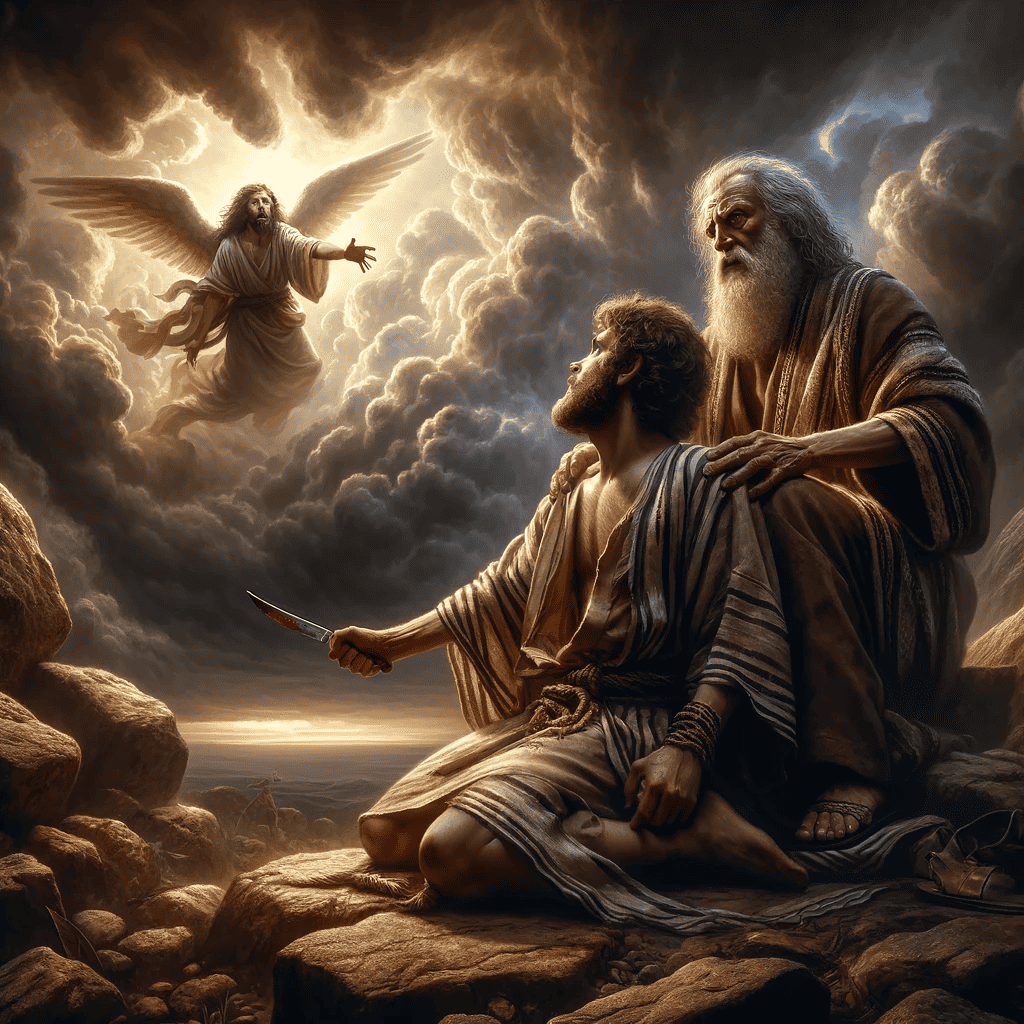
The Sacrifice of Isaac, found in Genesis 22:1-19, is a powerful and deeply moving story that highlights themes of faith, obedience, and divine provision. Here is a retelling of that story:
Once, God decided to test Abraham, a man of great faith, and said to him, “Abraham!” And Abraham responded, “Here I am.” God instructed him, “Take your son, your only son Isaac, whom you love, and go to the region of Moriah. Sacrifice him there as a burnt offering on a mountain I will show you.”
Early the next morning, Abraham got up and saddled his donkey. He took with him two of his servants and his son Isaac. When he had cut enough wood for the burnt offering, he set out for the place God had told him about. On the third day, Abraham looked up and saw the place in the distance. He said to his servants, “Stay here with the donkey while I and the boy go over there. We will worship and then we will come back to you.”
Abraham took the wood for the burnt offering and placed it on his son Isaac, and he himself carried the fire and the knife. As the two of them went on together, Isaac spoke up and said to his father Abraham, “Father?” “Yes, my son?” Abraham replied. “The fire and wood are here,” Isaac said, “but where is the lamb for the burnt offering?” Abraham answered, “God himself will provide the lamb for the burnt offering, my son.” And the two of them went on together.
When they reached the place God had told him about, Abraham built an altar there and arranged the wood on it. He bound his son Isaac and laid him on the altar, on top of the wood. Then he reached out his hand and took the knife to slay his son. But the angel of the Lord called out to him from heaven, “Abraham! Abraham!” “Here I am,” he replied. “Do not lay a hand on the boy,” he said. “Do not do anything to him. Now I know that you fear God, because you have not withheld from me your son, your only son.”
Abraham looked up and there in a thicket he saw a ram caught by its horns. He went over and took the ram and sacrificed it as a burnt offering instead of his son. So Abraham called that place The Lord Will Provide. And to this day it is said, “On the mountain of the Lord it will be provided.”
The angel of the Lord called to Abraham from heaven a second time and said, “I swear by myself, declares the Lord, that because you have done this and have not withheld your son, your only son, I will surely bless you and make your descendants as numerous as the stars in the sky and as the sand on the seashore. Your descendants will take possession of the cities of their enemies, and through your offspring all nations on earth will be blessed, because you have obeyed me.”
Then Abraham returned to his servants, and they set off together for Beersheba. And Abraham stayed in Beersheba.
The Sacrifice of Isaac not only demonstrates Abraham’s unwavering faith but also foreshadows the concept of substitutionary sacrifice, which is a central theme in Christian theology. This event in Abraham’s life is seen as a test of faith, a moment where his loyalty to God was proven beyond a shadow of a doubt. But it is also a narrative rich with symbolism and prophetic significance.
In the moment when Abraham raises his hand to sacrifice his son, his action is halted by the voice of God, demonstrating that God does not desire human sacrifice but obedience and faith. The provision of the ram as a substitute for Isaac prefigures the Christian belief in Jesus Christ as the ultimate sacrifice, provided by God to atone for the sins of humanity. Thus, the story of Isaac’s near sacrifice is often interpreted as a prelude to the New Testament’s message of salvation and redemption.
Furthermore, the name given by Abraham to the place of this event, “The Lord Will Provide” (Jehovah-Jireh), has become a profound declaration of faith in God’s provision in times of need. This story has been a source of comfort and assurance for countless believers, reinforcing the belief that God will provide in their moments of trial, just as He did for Abraham and Isaac.
The aftermath of this event also underscores the blessings promised by God to Abraham and his descendants, linking Abraham’s obedience directly to the prosperity and multiplication of his lineage. These promises have been interpreted as not only material but also spiritual, indicating the widespread impact of Abraham’s faithfulness on future generations and on the formation of nations.
The narrative closes with Abraham’s return to his servants, a return to life’s normalcy but forever changed by the profound encounter with God on the mountain. The story of the Sacrifice of Isaac thus closes on a note of resolution and promise, leaving a lasting legacy of faith, obedience, and divine provision that continues to inspire and challenge believers across generations.